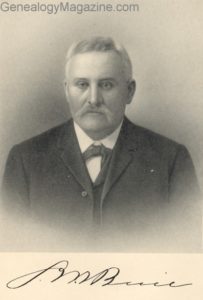 HON. L. M. BUIE, for four years judge of Jones county and well known in connection with the legal profession, has also attained success and prominence in connection with real estate operations. He was in Cerulean Springs, Kentucky, and acquired his early education in the common schools of that state, while his literary education was obtained at Cumberland University in Lebanon, Tennessee. He was graduated from the law department of that school in June, 1878, and practiced law in Hopkinsville, Kentucky, for two years. He then removed to Texas, settling in Jones county in 1881. This was prior to the organization of the county and of the selection of the county seat. Mr. Buie was chosen county judge in November, 1882, and again was elected in November, 1884. He served through that term, making four years in office and upon the bench he displayed the utmost fidelity to his duty, his decisions being based upon the equity and the law in the case and showing a thorough familiarity with the principles of jurisprudence.
HON. L. M. BUIE, for four years judge of Jones county and well known in connection with the legal profession, has also attained success and prominence in connection with real estate operations. He was in Cerulean Springs, Kentucky, and acquired his early education in the common schools of that state, while his literary education was obtained at Cumberland University in Lebanon, Tennessee. He was graduated from the law department of that school in June, 1878, and practiced law in Hopkinsville, Kentucky, for two years. He then removed to Texas, settling in Jones county in 1881. This was prior to the organization of the county and of the selection of the county seat. Mr. Buie was chosen county judge in November, 1882, and again was elected in November, 1884. He served through that term, making four years in office and upon the bench he displayed the utmost fidelity to his duty, his decisions being based upon the equity and the law in the case and showing a thorough familiarity with the principles of jurisprudence.
Judge Buie has been connected with the land business since 1881. In February, 1889, he was especially selected and commissioned by the Texas Central Railroad management to go and select the town site of Stamford. This he did and opened a land office there and he now operates land offices in both Anson and Stamford. The first train reached Stamford February 11, 1900, over the Texas Central road. He established a land office at that time from its beginning. In September, 1903, B. E. Sparks was admitted to a partnership in the business under the firm of Buie & Sparks. In December, 1881, he opened his office in Anson and has since maintained it, the business being conducted under the firm style of Buie & Kennedy, his partner being Ed Kennedy. This relation was formed in August, 1898, prior to which time the Anson partnership had undergone many changes. Judge Buie has a valuable farm in Jones county of over one thousand acres all under cultivation and in fact it is one of the best in the country. He likewise has the management of lands for different people for investment. He makes his home in both Stamford and Anson, as business may call him to either place.
Judge Buie is unmarried and he devotes his time to his private business interests and the welfare of the two towns with which he is associated. He has probably done more for the settlement of the country than any other one man. In the important commission of selecting a site for the new town of Stamford he displayed great wisdom and forethought.
The Texas Central Railroad then had its western terminus at Albany and with the building of the road to Stamford, a distance of forty miles, its present terminus, penetrating into the heart of an underdeveloped but an exceedingly fertile and rich country, it took away from other sections the great bulk of trade which formerly went to these places and a new commercial growth was established within its own limits. This has rapidly been going on and Judge Buie has always been a central figure in its active progress. As county judge he was an efficient and capable exponent in the enforcement of the laws of the country, was brave and courageous in the discharge of his official duties and did much toward breaking up those lawless organizations which always are found in a new country.
Source: B. B. Paddock, History and Biographical Record of North and West Texas (Chicago: Lewis Publishing Co., 1906), Vol. I, pp. 591-592.
